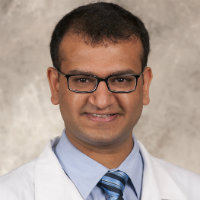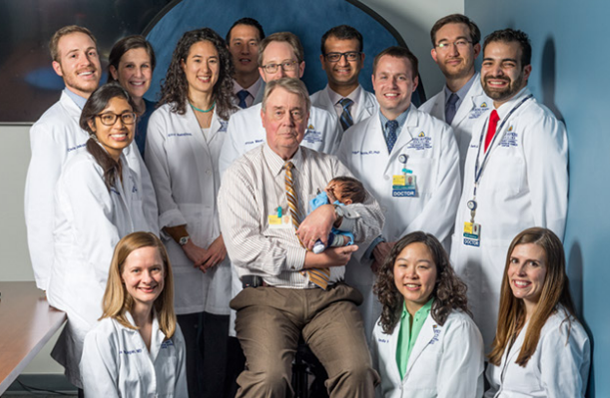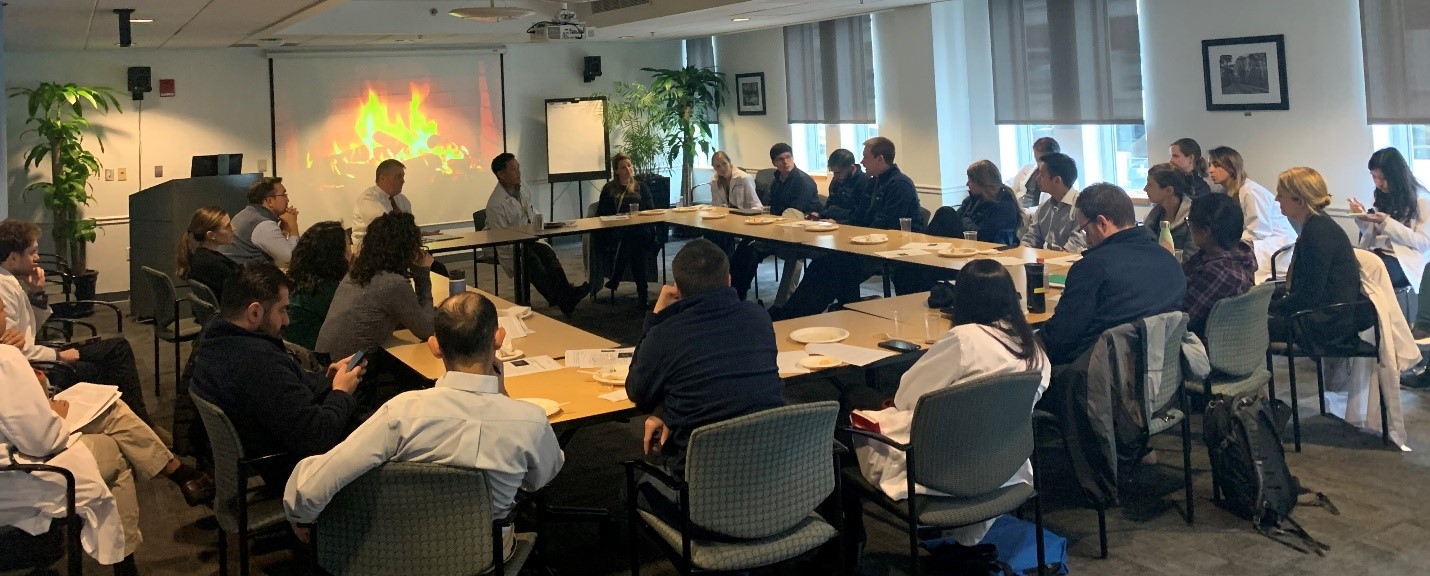 By Arjun Gupta, MD
By Arjun Gupta, MD
The first time I heard of Dr. Ross Donehower and the first time I met him were contrasting experiences. The first time I heard of him was while preparing my oncology fellowship application. I met with Dr. David Johnson, an oncologist himself and then chair of internal medicine at UT Southwestern Medical Center, where I was a resident. Dr. Johnson was, and remains, one of my most trusted mentors, and someone whose counsel I seek for most big decisions. Dr. Johnson advised me to explore opportunities at a hallowed center of education: ‘’Hopkins is fantastic. And Ross is great, a really wonderful person. You will do well there.’’ I looked up Dr. Donehower on the Johns Hopkins fellowship website that day, and bookmarked the page.
A few months later, I was in Baltimore interviewing for fellowship. Dr. Donehower was not one of the people I was listed to meet with formally, but I hoped to meet him at the evening reception. The reception turned out to be lovely—ample drink and food, happy-looking fellows, great conversation. When I thought no one was looking, I turned my back to the room and stuffed my face with two delicious crab cakes (I love seafood. This was despite a lovely lunch earlier and helpings of cookies between interviews). A few seconds later, I heard a voice behind me say, ‘’Hi, Arjun.’’ I turned to find Dr. Donehower standing a foot from me, smiling. ‘’Take your time,’’ he said. ‘’They’re good, aren’t they?’’ I nodded yes, and tried to chew without the strain showing through my cheeks. Fifteen seconds later, I finally replied, ‘’Hi, Dr. Donehower.’’ We shared a drink and had a lovely chat.
When the time to rank programs arrived, I communicated with Dr. Donehower by email. I was quite honest with him and did not indulge in cat-and-mouse games of ‘’I plan to rank the program highly.’’ His remarks—‘’Candor is always best. Good luck.’’—stay with me to this day. Now, as a chief fellow at the Hopkins fellowship program, where I see Dr. Donehower speaking with applicants and preparing the rank order list, I can see he truly believes that.

Dr. Donehower, center, with associate program director Dr. Kristen Marrone and the 2018-2021 Class of Johns Hopkins Hematology Oncology Fellows. Dr. Donehower is holding the baby of one of the fellows.
Six months into fellowship, I started to get my bearings, and met with Dr. Donehower to discuss research ideas. He gave me critical feedback about each project and asked me to pick the one or two I loved the best. In a roundabout way, wondering if I belonged, I sought his expertise and more so, his validation. I asked him, ‘’If I do project X, will you be proud of me?’’ Without hesitation, he chuckled and replied, ‘’Arjun, I will always be proud of you.’’ This experience completely changed my perspective on whether I belonged or not—that question did not need to come up! It also clarified to me who my primary stakeholder was—myself. I did not need to prove myself to anyone, other than myself.
Over the first year of fellowship, I learned clinical oncology from Dr. Donehower. His advice, to always be mindful of the patient experience and quality of life, has served me well and informed some of my research. We also shared some patients. After one of the patients we cared for died, despite us exploring every avenue, I was heartbroken. I took this loss personally. He recognized my distress, and emailed me, ‘’In oncology sometimes the best jobs you do in taking care of patients don’t result in a good outcome as is the case here. You should feel confident that you gave him all that you could give. You have been more than his doctor and that is rare.’’ First year of fellowship is clinically intense, and when one heads home in the evening, it is common to feel soaked and saturated in oncology. With that, one can come to expect only ‘’good outcomes.’’ Dr. Donehower helped me understand that all physicians, but I think especially oncologists, can get too deeply entwined in the notion that our patient’s survival depends profoundly upon us: our care plans, our advocacy, our immediate availability. The downside of this self-aggrandizing thinking is that we are left with the feeling of failure and don’t have the tools to deal with it. Burnout, wellness, and resiliency training sometimes feel like empty buzzwords, but in our fellowship, fellows look forward to ‘’Donehower chats’’ where he uses his experience to chat about these topics. These informal sessions, along with chats with other expert faculty (“Reflection Rounds”) are helpful for fellows to frame their lives alongside our primary jobs. As a first-year fellow, I invited a patient and his partner to join a noon conference focused on them. The patient had weeks to live, and spent precious time with our fellowship educating fellows. Dr. Donehower attended that session, and personally went up to thank the couple. After the conference, he hurriedly emailed me to make sure we had arranged (at least) a parking voucher for them.

Dr. Donehower, along with Dr. Daniel Laheru, leads a ‘"fireside chat’’ with the Johns Hopkins Hematology Oncology Fellows in December 2019. This event has continued virtually during the pandemic.
Sometimes, in academic medicine, it is easy to forget the bigger picture. Dr. Donehower is a master at reminding us to set internal, not external, goals. Towards the end of first year of fellowship, I submitted a clinical trial proposal to the ASCO/AACR Vail Clinical Trials Workshop. A couple of months later, I received notification that I did not get into the workshop, but had been put on a waitlist. I dejectedly emailed my mentorship team, including Dr. Donehower. He replied, ‘’This decision doesn’t define the quality of your proposal. If you believe in it, move forward.’’ A couple of weeks later, I was notified that because some folks dropped out, I now had the opportunity to attend this workshop! I was elated and sent an email with several smileys to him. He congratulated me, and added, once again, that the quality of my proposal had remained unchanged, regardless of acceptance or not! It is important to have mentors who bring you back to the basics. Even in one-on-one meetings that he holds with all fellows, he does not emphasize grants, publications, or external achievements. I am sure he can speak at length about these. But for him, success and achievement are about the process, about learning, about discovering what makes you curious and happy.
Another thing I noticed about Dr. Donehower is his focus on clinical excellence. Around the Cancer Moonshot, T32 grants, and academic arms race, it is easy to think about research first while recruiting fellows. Dr. Donehower emphasizes the importance of being great clinicians, scientifically and empathetically. That comes number 1 while recruiting fellows.
Dr. Donehower stands up for fellows and is a trainee advocate. I noticed that about my residency program director, Dr. Dino Kazi, as well. ‘’It is (almost) never the trainee’s fault. They came to us in a good state. If anything bad happens, it is on us,’’ is the general mantra. When there is an issue about a fellow (very rare), Dr. Donehower is objective, fair, and protects the trainee first. When administrative or workflow changes threaten to disproportionately burden fellows (not uncommon in a large institution, especially with the COVID-19 pandemic), he is quick to point it out and suggest alternate models. When a fellow in the program had some issues with a mentor, as can happen in any relationship, he pulled the fellow aside before a group meeting and said, ‘’You do not need to apologize during this session. It is not your fault.’’
Running a program successfully for 30 odd years—perhaps one of the longest serving in history—cannot happen without excellent coping mechanisms. I learned about one of his techniques during the early stages of the pandemic. Emotions were running high on a Zoom call, and fear and the unknown were driving several fellows’ comments on safety protocols while caring for people with COVID-19. Dr. Donehower calmly answered all questions. At the end, a fellow apologized for getting emotional. Dr. Donehower replied, ‘’I may not agree with something, but I do not take it personally.'' The next day, I read a piece in The New Yorker in which Dr. Anthony Fauci reported using a similar approach when encountering politics in science, drawing inspiration from his favorite book of philosophy, The Godfather: ‘‘It’s nothing personal, it’s strictly business.’’
Dr. Donehower’s impact is not limited by time and space. A co-fellow who graduated early and is now faculty at another institution texted me a few weeks ago. He had gotten into an argument about patient care with a consulting team. He was about to let his lid off, when he remembered Dr. Donehower’s advice from orientation day 1: ‘’Choose civility.’’ As I interviewed for a first faculty position over the past few months, I met with senior oncologists all over the country over Zoom. Whenever I mentioned that Dr. Donehower was a core mentor, inevitably, the interviewer would mention their own experience with him, even if just for a minute, whether at their own fellowship interview (sometimes 20 years ago), or at a conference (sometimes 30 years ago).
As I wrap up fellowship and start planning the transition to faculty myself, I will keep a few learnings from ‘’Dr. D,’’ as he is affectionately referred to in the fellowship, in my head: clinical excellence first, do research if and on things that make you happy, and always keep time to unwind with baseball (cricket for me) and crab cakes!
Thanks for everything, Dr. D :)
Dr. Gupta is a chief fellow at the Johns Hopkins Hematology/Oncology Fellowship. His academic interests include gastrointestinal cancers, supportive care, and identifying and ameliorating hidden toxicities of receiving cancer care. Follow Dr. Gupta on Twitter @guptaarjun90. Disclosure.


Recent posts